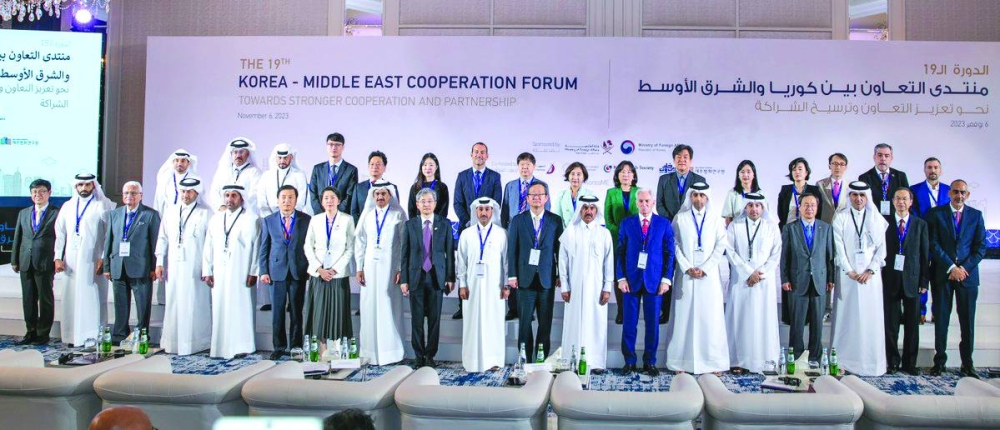The 19th edition of the Korea-Middle East Co-operation Forum was held Monday under the theme: "Korean and Middle East: Towards Stronger Co-operation and Partnership."
The forum took place under the patronage of the foreign ministries of Qatar and Korea, in partnership with the Diplomatic Institute of the Ministry of Foreign Affairs, the Middle East Council on Global Affairs, the Korea-Arab Society, the Jeju Forum for Peace and Prosperity, and Ibn Khaldun Centre at Qatar University.
The forum was attended by a gathering of prominent political, economic, and academic figures from Korea and the Middle Eastern countries.
Doha hosted the forum for the first time since its inception, amidst growing relations and co-operation between Korea and the countries of the Middle East and North Africa in various fields, including politics, diplomacy, and culture.
HE the Secretary-General of the Ministry of Foreign Affairs Dr Ahmed bin Hassan al-Hammadi said in his opening speech that the forum is inaugurated as the two sides are on the verge of celebrating 50 years since the establishment of relations between the two countries in 1974.
He added that relations between Qatar and Korea have witnessed continuous development on all levels, leading to the elevation of bilateral relations to the level of comprehensive strategic partnership.
He further noted that this forum takes place amidst difficult political and humanitarian conditions in the region, with the continuous deterioration and escalation of conflict in the occupied Palestinian territories and Israel, ongoing indiscriminate shelling in Gaza, and attempts at forced displacement and the siege of its people.
He extended his greetings and appreciation to the Korean people and human rights organisations in Korea, which hold protests against the continuous genocide of the Palestinian people by Israel.
Bearing significance on its first convening in the Middle East in five years, Deputy Foreign Minister for Political Affairs at the Korean Ministry of Foreign Affairs, Byung-won Chung, emphasised in his speech the importance of the forum, highlighting the significance of dialogue and democracy in resolving conflicts in the Middle East and North Africa.
Director of the Diplomatic Institute at the Ministry of Foreign Affairs Dr Abdulaziz al-Horr emphasised the strength of relations between Korea and Qatar, and all the countries in the region, pointing out that the true strength of their relationship lies not only in technology, infrastructure, and liquefied gas but in the human, cultural, and diplomatic bonds fostered over the years. He noted that these connections are the lifeblood of their partnership, fostering mutual understanding and respect.
Executive Chairman of the Jeju Forum for Peace and Prosperity Young-hoon Kang expressed gratitude in his speech to the officials of both countries' foreign ministries and organisers for hosting and arranging the session, asserting that this forum would serve as a means to enhance co-operation in key sectors such as defence and energy, while also broadening the scope of collaboration to address new challenges.
Director of the Ibn Khaldun Center at Qatar University Dr Nayef bin Nahar emphasised the importance of cultural co-operation and exchange in strengthening relations between Korea and the Middle East and their people, stating that this forum is essential in the context of the East discovering itself and recognising the interrelations among Eastern countries and their people, away from the dominance of the European centre.
Qatar's ambassador to Korea, Khalid bin Ibrahim al-Hamar, highlighted the significant transformation in bilateral relations in various fields of co-operation, moving from traditional areas such as infrastructure, energy and construction towards new domains such as smart industries, agriculture, health, renewable energy, and hydrogen.
He emphasised that this elevation to a strategic partnership level will open future prospects for various sectors and companies to benefit from the economic diversity of Qatar and Korea.
The event included three panels discussing future prospects for Korea and the Middle East; strengthening economic partnerships in the era of green transformation; and the future of humanitarian and cultural ties between Korea and the Middle East.
In conclusion, both the Secretary-General of the Korea-Arab Society Chang-Mo Kim, and Dr Tarek Youssef, who is the Senior Fellow and Director of the Middle East Affairs Council for International Affairs, emphasised the importance of the meetings and dialogues in confronting the challenges arising from the uncertainty about the future of globalisation.

